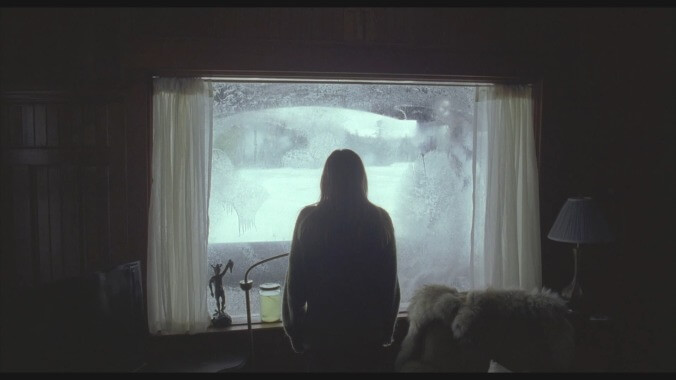In foreboding square footage, and certainly in volume of naked old crones climbing out of bathtubs, the lodge of The Lodge has nothing on The Overlook. All the same, a comparable chill blows through frosted windows and down shorter, less opulent corridors. The Shining isn’t the only wintry classic that might leap to mind watching this new addition to the subzero horror canon. Even before it pops up on a TV, John Carpenter’s arctic The Thing asserts its influence through the paranoia and distrust that blankets the structure as thickly as any snow. “Who goes there?” those trapped within might ask. It’s not ghosts or shape-shifting extraterrestrials but maybe a more powerful force looking down from above, disapproval scrawled across His face.
The stranded are a family, locked in a cold war even before the harsh weather traps them indoors. Teenage Aidan (It’s Jaeden Martell) and his younger sister, Mia (Lia McHugh), give a chilly reception to their father’s new fiancé, Grace (Riley Keough). Their resentment runs deeper than the usual reluctance to warm to a surrogate parent; it stems from a trauma The Lodge inflicts early, the tragedy and unspeakable loss—a jolt of shattering violence—that sends the plot into glacial motion. Grace, as it turns out, has deep wounds of her own. Her father was the leader of a radical Christian cult whose entire congregation committed suicide when she was 12, leaving her the only survivor. The first real glimpse we get of her is in the front seat of a car, back to the camera, eyes in the rearview mirror. They want to appear friendly. They mainly look haunted.
Viewed from one vantage, this is a horror movie about a really selfish dad. That would be Richard (Richard Armitage), Aidan and Mia’s father, who attempts to rush a relationship between his grieving kids and the damaged woman with whom he’s trying to build a new life. (The two met through work; though never stated outright, the implication is that he was her psychiatrist, or at least studying the headline-grabbing case of the sect she outlived.) Things are tense enough before Richard invites Grace to join the family for Christmas at their secluded vacation home in the mountains. And they get tenser still when he heads back to the city for work, leaving the three alone for a couple days. Sharp words are exchanged. Showers are spied upon. Pistols and leaky gas heaters make Chekhovian appearances. All the while, a set of stern eyes peer out from a creepy painting, centuries of institutional disapproval implicit in their gaze.
The plot, claustrophobic as the cabin, comes courtesy of writer-directors Severin Fiala and Veronika Franz, bringing white knuckles to white Christmas and their now-signature intensity from Austria to America. The pair’s debut, Goodnight Mommy, was a nasty little three-hander with a superficially similar premise built around the war of wills between a young woman and the two rebellious kids she’s stuck looking after in an isolated house. That movie had a really obvious twist that didn’t much dampen its queasy thrills. The Lodge likewise hinges on a delayed reveal, less predictable but also more convoluted; its plot mechanizations—the hows of what happen—require a rather significant suspension of disbelief. Yet Fiala and Franz also envelop the audience in a nightmare subjectivity that makes the logistics feel less important. What matters is the characters’ boiling existential panic, which envelops the whole movie like the blizzard that snows in its lost souls.
Though it bears the logo of Hammer, the famous U.K. production house that kept Dracula and his gothic kin in theaters through the ’70s, The Lodge is in keeping with contemporary trends in slow-burn horror. That means lots of atonal skitters, ominously empty rooms, and a camera that moves at a creep and stays at an almost accusatory distance. Were they not probably developed simultaneously, one might accuse the film of biting the artisanal gooseflesh style of Hereditary; note the inciting shock of bereavement and dollhouse motif. In truth, The Lodge might have benefitted from a little of Ari Aster’s crooked sense of humor. There’s the shadow of a dark cringe comedy in Grace’s inability to win over these sad, sullen brats, but it’s suffocated by the relentless, grey-blue mood of despair Fiala and Franz establish and never once deviate from. Still, as a thriller about bone-deep religious anxiety, it’s admirably oppressive—in no small part thanks to Keough, who’s fast becoming a pro at pulling viewers into the sphere of her spooky dissociative calm. See also: Hold The Dark, another tale of minds coming unglued as temperatures drop.











![Rob Reiner's son booked for murder amid homicide investigation [Updated]](https://img.pastemagazine.com/wp-content/avuploads/2025/12/15131025/MixCollage-15-Dec-2025-01-10-PM-9121.jpg)

























![HBO teases new Euphoria, Larry David, and much more in 2026 sizzle reel [Updated]](https://img.pastemagazine.com/wp-content/avuploads/2025/12/12100344/MixCollage-12-Dec-2025-09-56-AM-9137.jpg)



